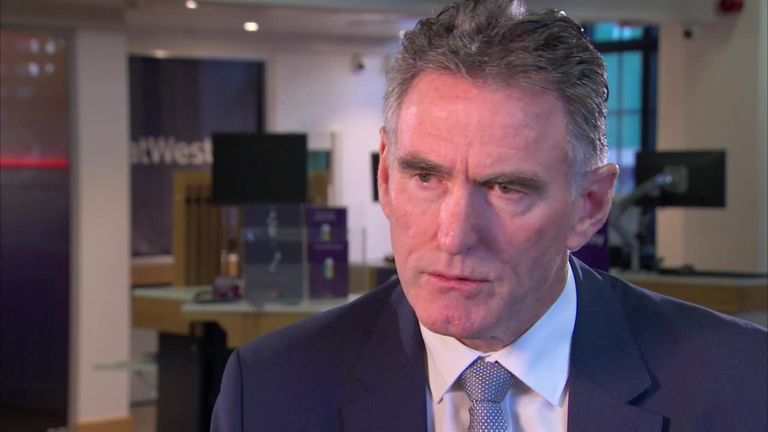RBS takes 拢100m provision for 'economic uncertainty' pre-Brexit
The bank's latest results show further profit progress but sees greater risks ahead as the clock ticks down to Brexit.
Friday 26 October 2018 16:48, UK
Royal Bank of Scotland (RBS) has taken a 拢100m charge, citing "a more uncertain economic outlook" as the UK prepares to leave the EU.
The bank - the first major UK lender to make such an impairment provision - made the announcement while unveiling further progress in the restoration of profitability following its taxpayer bailout a decade ago.
Operating profit before tax grew by over 10% to £961m in the third quarter of its financial year.
It credited lower costs from its transformation and increased digitisation for the performance as income remained stable - rising 15%, partly reflecting lower disposal losses but shaky demand for borrowing in the run-up to Brexit.
The impairment charge suggests the bank is worried about the ability of customers to pay debts.
Indicators suggest the economy is slowing again as the clock ticks down to March 2019 with no Brexit deal currently in the bag.
Business groups point to a reluctance to invest, given the current climate and, in the run-up to next week's Budget, there have been a string of forecasts warning of an economic easing, not only in Britain but the world economy.
:: What to look out for in the 2018 budget
RBS shares lost more than 4%.
The lender, which remains 70%-owned by the taxpayer, paid its first dividend in a decade during the summer after a massive mis-selling penalty agreed with US authorities cleared the way for the bank to focus on the future.
The bank's chief executive, Ross McEwan, said of the third quarter: "This is a good performance, set against a highly competitive market and an uncertain economic outlook.
"We are growing lending in our target markets and are in a strong position to support the economy.
"We're aware there is much more work to do and are fully focused on improving for our customers."




